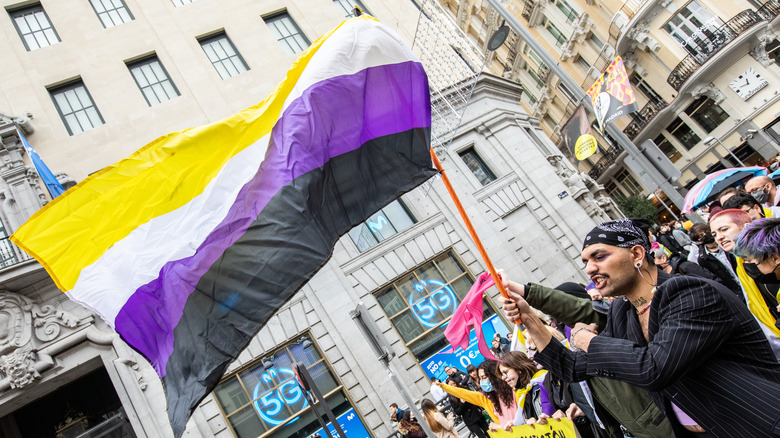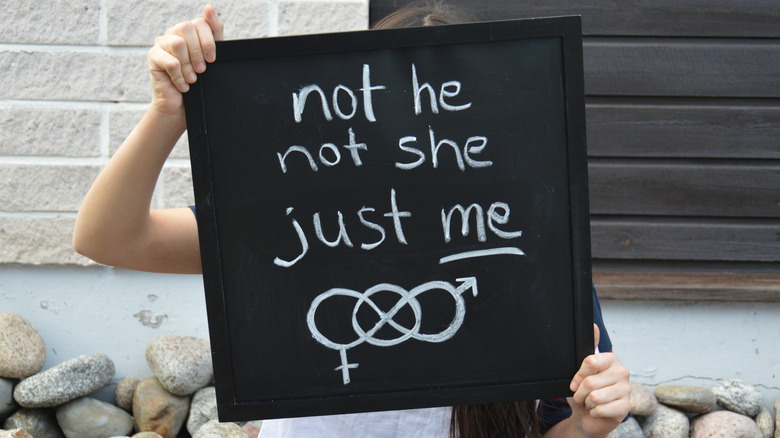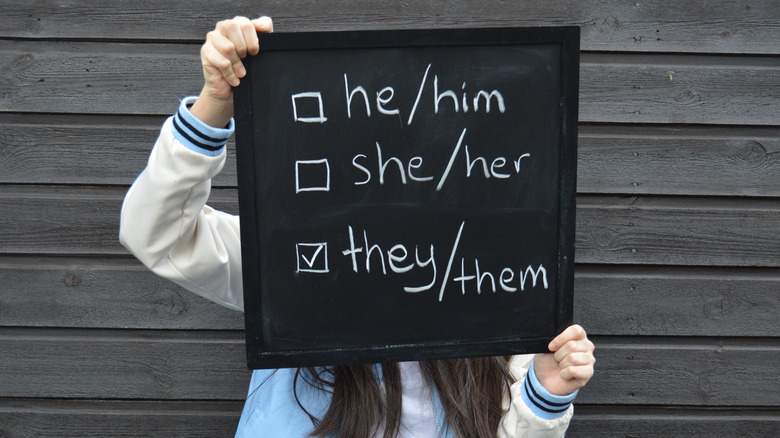Everything You Need To Know About The 2022 Non-Binary Awareness Week
Pride Month 2022 may be over, but starting yesterday, July 11, 2022, and through July 17, 2022, activists are taking to social media to celebrate Non-Binary Week.
The week dedicated to raising awareness and sharing information on things like better ways to be an ally surrounds International Non-Binary People's Day: July 14. The date, Dictionary.com explains, falls exactly between International Women's Day (March 8) and International Men's Day (November 19), as a symbolic gesture of what the day is raising awareness for. The first year the day was observed was 2012 and, since, it's expanded into a week-long awareness campaign.
Unlike other awareness days, Activist Bookshelf explains that Non-Binary Awareness Week, and Non-Binary Awareness Day, don't have evolving themes. The message has always been the same since the idea's inception: celebrate non-binary people and their communities. It's a time, "to encourage other people and organizations to recognize and uplift non-binary people, and a call for everyone to work to make society more welcoming and supportive for non-binary people."
Non-binary, Dictionary.com explains, "is often used as an umbrella term that covered a lot of people—including anyone who doesn't consider themself entirely male or female." Some non-binary consider themselves trans, some consider themselves agender, and others don't feel they're either. Trans-led media platform Translash points out that this is the "beauty" in nonbinary: the person gets to define what nonbinary means to them.
Activists share why Non-Binary Awareness Week is so important
When asked about why raising Non-Binary Awareness was important, activist Jacob Tobia told Equity that they felt, "having days where you get to talk about your community and honor the experience of everybody that's part of the community is wonderful." But in order to be able to talk openly and honor or celebrate people of the non-binary community, Tobia feels there is still a lot of work to do.
For starters, there's a non-binary stereotype that erases the experiences of those non-white, non-skinny, non-female at birth people who identify as non-binary. "That's the idea of what a non-binary person is," Tobias says, "and that is not all of us and we have to transform that ideal we have to get visibility for non-binary folks aside, for assigned female folks who are non-binary... we have to have visibility for hairy transfeminine non-binary ladies like me, we need visibility for non-binary older folks as well as younger folks."
A 2021 study released by the UCLA School of Law's Williams Institute found there are around 1.2 million LGBTQIA adults in the United States who identify as non-binary. Additionally, a 2018 study found more teenagers than ever are identifying as transgender or gender-fluid, which according to Daniel Shumer, a specialist in trans medicine at the University of Michigan, suggests that "previous estimates of the size of the transgender and gender-non conforming (TGNC) population have been underestimated by orders of magnitude," via American Academy of Pediatrics.
Here's how to be a better ally to non-binary people
No matter your gender identity, this week is a great time to educate yourself more not only about non-binary, trans, and intersex culture, but also how to be a better ally.
Helping nonbinary people get recognition is just one of those ways. According to OutRight Action International, only 11 countries and some states in the U.S. have made it legal to identify as non-binary on official government documents. This is why getting on social media and using #InternationalNonBinaryDay is a great way to promote educational resources, as well as a space to share messages of love, support, and acceptance. Sharing resources from non-binary activists is especially helpful in making information about gender identity seen and accessible, says Activist Bookshelf. This includes requesting books by and about non-binary or gender identity at your local libraries and bookstores.
Another part of being a good ally is realizing how difficult it might be for someone to explain their gender to someone who's never heard of it before, and how much language matters. Adopting neutral terms, Activist Bookshelf says, is another good step towards normalizing a gender spectrum.
For trans allies, Activist Bookshelf also suggests making sure trans spaces are safe spaces for non-binary people, too. "Non-binary people have been told that we 'aren't trans enough,'" explains Activist Bookshelf, "and [are] excluded from trans spaces too many times for too long." Make sure you're getting a non-binary perspective on trans issues, they urge.


